The role of technology in legacy processes has changed the way services are designed. Education is one of the prominent areas where the scope was immense and the outputs have been quite rewarding.
Online and eLearning have emerged as the most significant focus for both those seeking means to learn and the development service providers as well. Every aspect of eLearning today is developed with the thought of keeping the essence of knowledge sharing and teaching alive. The available options and choice of modules have contributed to taking knowledge seeking to a new level.
Educational apps seem to be the future that will set the stage for what dimensions to expand on. Through this blog post, we give you information on steps you can follow as a guide if you are one of those seeking to enter the ed-tech space and contribute to the growth of this sector.
Table of Contents
Latest Trends in Mobile Learning and Education App Development
As learning transitions from classrooms to homes, developing learning formats that are easily accessible over multiple devices has become an imperative. Allowing learners to enhance their horizon of the way they pick up their courses or tutorials, mobile devices like tablets and mobile phones are increasingly becoming the popular mediums.
With the expected rise in mobile assisted services like grocery, food, and general e-commerce, the app development companies have solved education through the means of mobile too. Apps like Duolingo, Coursera, Google Classroom, and many more for different kinds of learning have gained much traction, especially during the unfortunate pandemic lockdown.
Trends and Stats
Current trends bring clarity about the choice and convenience of the learners as well as the teachers or experts involved.
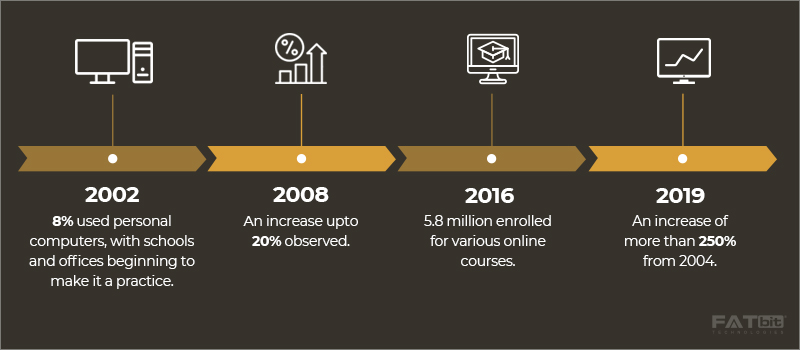
- With eLearning apps being the most downloaded with an 8.5% rate, the highest on mobile devices.
- With the growing market for online learning tools, the demand for new ed-tech tools amongst investors is increasing.
- Advanced technology-backed tools are attracting all the investments.
- With the whole of eLearning occupying close to 20% of the investment structure, almost 16% directed only to mobile learning tools.
- Along with smartphones and tablets, the cloud coming into the picture has made PCs almost obsolete. Smart cloud storage has enabled accessing data on mobile devices from anywhere at any time.
- Improvising the learning processes lead to the introduction of microlearning, allowing professionals at work to catch up on topics quickly as ready reckoners. Corporates today are opting for applications providing crisp pointers on various matters of expertise.
Looking at the current scenario as well as the predictions for the future, mobile apps seem to remain as the choice for developing most learning options.
The figure below depicts the rise of educational apps in 2020, dominating the industry as the pandemic wave hit the world.
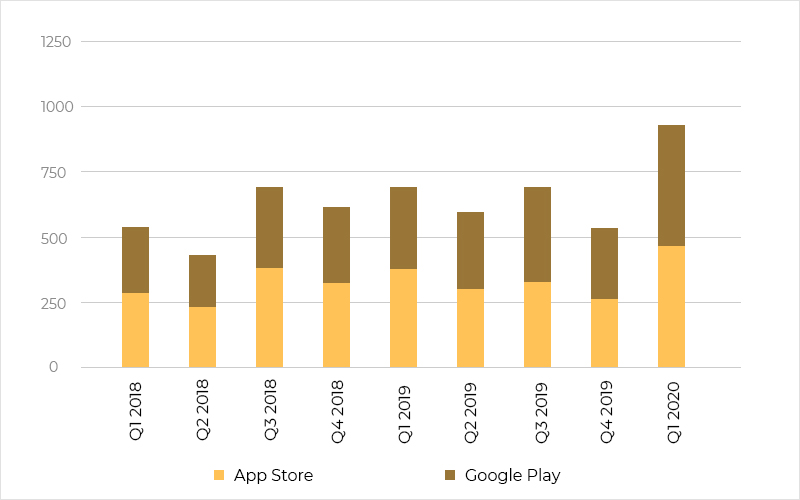
Source: Statista
eLearning Market Tendencies and Favorable Geographies
If we consider where the mobile app development industry is headed to, the geographies actively engaging in development of the mobile formats of eLearning are probably going to change as well as dominate the market tendencies.
Migration of learning patterns to online or eLearning depends on certain market factors like stability, economic growth, adoption rate of technological developments, and penetration of smartphones and their usage by large. As projected, the USA and Canada seem to fit these criteria of becoming the largest educational app markets by 2025.
Considering the most prominent of the factors, the students, and the rate at which their base is foreseen to increase, the Asia Pacific region will presumably dominate. Also, rate of implementation of technology in these regions as well as in Singapore and Australia is highest, so lucrative geographies for the ed-tech app development markets lie in these areas.
Not Sure How To Begin Developing An eLearning App? Partner For Custom Development Services
Benefits of eLearning App Development
While we consider discussing the benefits of eLearning app development, it is important to understand the benefits in both, business as well as academic learning. Although there are specific advantages to both segments.
For Businesses:
– Track employee progress easily
– Provides ready access to solutions
– Improve productivity and efficiency
For Academic:
– Bridge gap and connect experts to learners across boundaries
– Allow a flexible learning format for all types of requirement
We enlist here for you the most prominent benefits that strike a chord as to why eLearning app development is going to be the most widely accepted formats.
Mobile or Ubiquitous Learning
An eLearning application enables users to access their knowledge banks from absolutely any place being fed with an internet connectivity. Mobile devices like tablets and smartphones have become common household gadgets, and if these were to become platforms of gaining education in any form, their purpose would be served.
Educational applications downloadable on iOS and Android systems will facilitate a ubiquitous form of eLearning. Students or learners can connect for their learning program both via audio as well as video over the application itself. Offering connectivity and harboring large quantities of content at any point of time are just a few of the benefits that add to the weight of going for an ed-tech app development.
Progressive Form of Learning
Learning is a prominent area being conceptualized on a whole different platform enabled by technological advancement. eLearning applications available readily over mobiles, tablets, and desktops have taken skill enhancement and education to a new level.
Providing robust server support with enormous storage capacity, the eLearning applications are exploiting the cloud technology to the best of its capabilities and in the best interests of the industry segment.
When the learning formats and modules become so advanced, the basic nature of the process becomes a progressive one. eLearning app development has connected the software world so intricately into the everyday lives that it has now become impossible to stay away from the impact of progress across domains.
Systematic and Self-learning Focussed
References have depicted that when the learning process is intermediated with intermittent testing, it enhances memory and results in better retention of concepts. eLearning applications supplemented with pop up quizzes, quick multiple choice tests, and assignments bring an element of self-assessment in between the learning process.
The process in which learning proceeds with components of learning content and evaluation at regular intervals promotes a streamlined learning with better retention in the working memory.
The scores prompt the learners to do more and achieve more moving ahead in the course of the program enrolled. The app design allows integration of this element, enhancing the learning process holistically.
Better Outcomes
Improved learning elements, options to merge interactive learning with self-study, and self-assessments with eLearning applications will automatically give better outcomes with respect to performance and progress.
Learners will be motivated to cover more and will always be enthusiastic about what will come ahead, giving an edge to the eLearning apps as a medium for learning.
Economical
The economical significance of developing educational apps is convincingly demonstrated by the fact that where only 1-2% students are registering for on-campus courses, the growth in the percentage of students choosing online methods is nearly 5%.
Costs related to travelling, on-site campus fees, as well as other facilities are anyways more compared to what the eLearning apps charge. The method of learning through education apps proves economical as well as more in control of the learner, and hence ends up being the choice.
Different Types of Education Apps
Education app development is increasingly becoming the pathway ahead for major technology service providers and the module of choice for the eLearning audience. The development of these apps is however dependent on the audience it will invite or target.
Based on the majority of user types of educational apps, they can be classified broadly into learning solutions for students, teachers, and adults who take up self-learning through online courses.
Learning Solutions for Students
Developing educational or learning apps for students is one of the most profitable steps to take from a business point of view. Catering to a user base that is the litmus test for the success of a technological development is a challenge in its own. Students by definition can vary with respect to age and type of knowledge being gathered.
The mobile learning solutions developed thus need to be diverse as well as specific, both at the same time to draw maximum benefits while reaching the widest user-base possible. We have tried to discuss the prominent types of learning apps being developed for students.
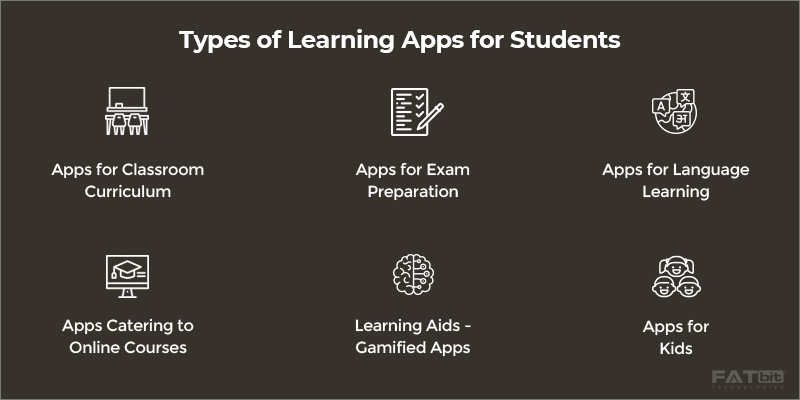
Apps for Classroom Curriculum
Educational apps developed with the purpose of facilitating students with their everyday classes are mostly supporting the school curriculum. The apps provide a medium for the students and teachers to connect for teaching the subjects as per regular school schedule. There is provision to share video, image, as well as written content during the ongoing video classes.
Also, the teachers and the students both can upload, access, moderate teaching material, assignments, and schedules over the app. The flow of information both ways allows a virtual classroom like environment.
These apps came out as a massive contribution to the education industry during the global pandemic 2020. Schools, colleges, and students were able to survive their roles due to the popularity and reach of smartphones in every nook and corner.
Apps for Exam Preparation
While educational eLearning applications allow users access learning material at the ease of their availability with respect to time and location, they can be developed for more specific causes that augment the entire learning experience.
Developing specific applications that support various test formats like multiple choice and subjective, tutors can upload various question paper types for different subjects, just to acquaint the students with examination scenarios.
Users from all walks, school students, entrance exam aspirants, as well as advanced studies, download these apps to get an understanding of the kinds of questions that they can face in their exams. The instant evaluation of their attempt allows them an assessment that helps propel their learning process.
Apps for Language Learning
Learning an additional new language is more of a trend. Since the world is becoming a closer knit place, people want to learn a new language to explore opportunities in the geographies of their interest.
eLearning applications developed for language learning purposes provide a platform for language experts or tutors from various parts of the world to sign-up for tutoring lessons, either one-on-one or group sessions, and share their language proficiencies as per demand.
The learners can search for tutors and compare profiles as per their need, purpose, and expectation from the language course.
Suggested Read: How To Build An Online Language Learning Website Like Verbling– Business Model & Key Features
Apps Catering to Online Courses
Advanced and professional courses are no more limited to a college curriculum. Students prefer taking extra courses to strengthen their knowledge spectrum for a particular subject or even the entire field. These apps are specially designed with separate databanks for different course materials.
Users can register and access material for the course purchased and personalize their account based on their choices. Meticulously designed courses to provide complete understanding of a topic in many interesting ways helps improve compliance to the subject matter as well as drive interest to learn more.
Learning Aids – Gamified Apps
The apps that offer smart or unique ways of learning different concepts are developed on gamified basics. They help engage students in different activities in order for them to learn a particular topic. With gamified programs supporting the learning process, the popularity of these apps is most among the school going students.
Reading concepts on the mobiles or devices could get tiring after some time. The gamified apps tend to break the routine and refresh minds by involving the students to actually participate in creating, developing, building, and applying the things they have studied.
Apps for Kids
Despite the debate of reducing screen time for kids, the COVID outbreak forced adoption of modern eLearning methods. It is this opportunity that the developing community grabbed and made the best out of, so as to make the kids feel channelized in the most efficient ways.
eLearning applications that make learning an entertaining and engaging experience for small kids changed the idea of introducing learning concepts to children. Parents today look for apps that take their kids through an innovative process of learning different things, those with which they can relate to in their everyday lives as they grow.
Learning Platforms for Teachers
While developing education apps the focus is almost always on the learners. But expert instructional designers understand that a dedicated app is needed for their teaching and assessment activities also. These apps provide them the tools and easy management of their student learning aids preparation and saving them for further references.
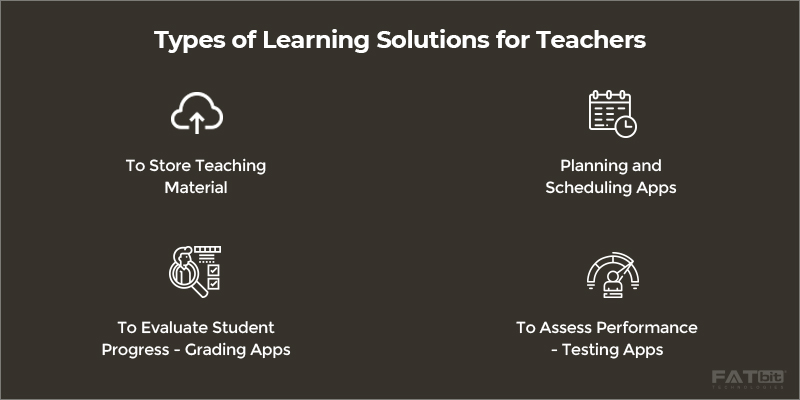
Suggested Read: How to Start an Online Tutoring Platform – In-Depth Study of Business Models & Key Features
To Store Teaching Material
Online or eLearning desires preparing teaching aids and content in formats that can be easily shared via app platforms. PDFs, powerpoint presentations, videos, as well as audio content requires quite a lot of space on the device memory.
Apps have made feasible storing endless amounts of such data or content on the cloud, and accessing it all easily at any time. Becoming a one spot storage location for all the teaching material, systematically organized into separate compartments for convenient access whenever needed is one of the primary benefits the educational app development has added to eLearning.
Planning and Scheduling Apps
Those managing students and preparing material for learners are doing a lot of planning as per the progress of each course or curriculum. Separate apps that provide calendars with options to set reminders and updates enhance the efficiency of those organizing various eLearning programs.
Planning and scheduling apps just make their lives easy by helping them store upcoming events and activities in a manner that they can easily be reminded of them well in advance.
To Evaluate Student Progress – Grading Apps
Educational apps making lives easy could not have been better demonstrated than by grading apps. Where an average teacher spends more than 95% of the time checking and analysing assignments, grading apps help automate the process, saving their time, giving them more to plan new tasks.
These apps not only evaluate the assignments, but provide a student-wise, class-wise, subject-wise, and various other types of analytical reports to the teachers to use during the online learning programs.
To Assess Performance – Testing Apps
Testing apps are developed specifically for teachers to easily prepare different formats of assessments for the students of different classes, curriculums, or courses. These apps allow teachers to easily generate tests and assignments along with their answer keys stored in a stepwise manner.
Students can register and access these as per their individual or class learning needs. The applications can be developed so as to assist students to analyse their growth subject-wise. The apps can also be supplemented with an LMS (learning management system) that allows specific tests or assignments to different students based on their grasp of the subject.
Self-Learning Solutions for Professionals
Experts interested in sharing their knowledge and contributing to the advancement of their fields need to have dedicated platforms for the same.

eLearning mobile applications that allow them easy ways to upload and share their teachings, via video lectures, learning aids, written content as presentations, and more, are increasingly gaining popularity among the teaching community.
Advanced Courses
These apps are supported by a strong cloud infrastructure that harbor data related to advanced professional courses. Those registering on these apps usually pay per course or lecture or a series of talks.
The apps enable accessing data on cloud infrastructure uploaded by individual experts or facilitators like Udacity, conveniently available even in offline mode if purchased and downloaded inside the application.
To Attend Live Talks
Certain eLearning apps are developed only to connect learners and experts for live talks and lectures. They provide a base where viewers can register for scheduled lectures from professors and seniors anywhere in the world.
They facilitate live access to these programs, and even some interaction or question-answer sessions post the talks. A direct server provides a platform for all users to connect simultaneously and visualize the talk along with audio connectivity for interactions.
Essential Features to Include While Developing an Education App
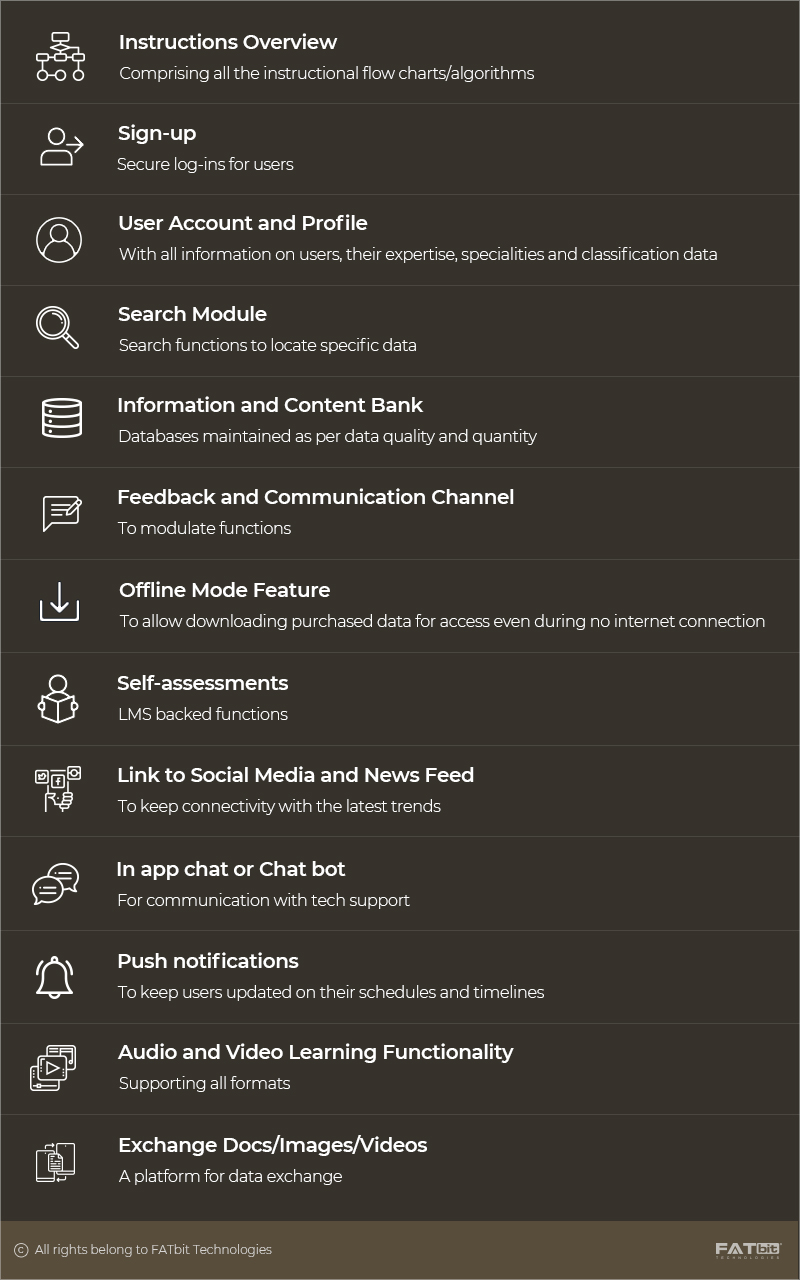
Some of the components of the education app architecture that help coordinate the development process are:
- Interface: Interaction between users – Synchronous or asynchronous
- Communication – One way or both ways flow of information
- Monetary Interactions – Purchases happening over the app
- Code Availability – Open source or on-pay basis
- Multiplicity – A single app or a community
- Location – Services as per user location
- Safety – Exchange allowed as per user identity
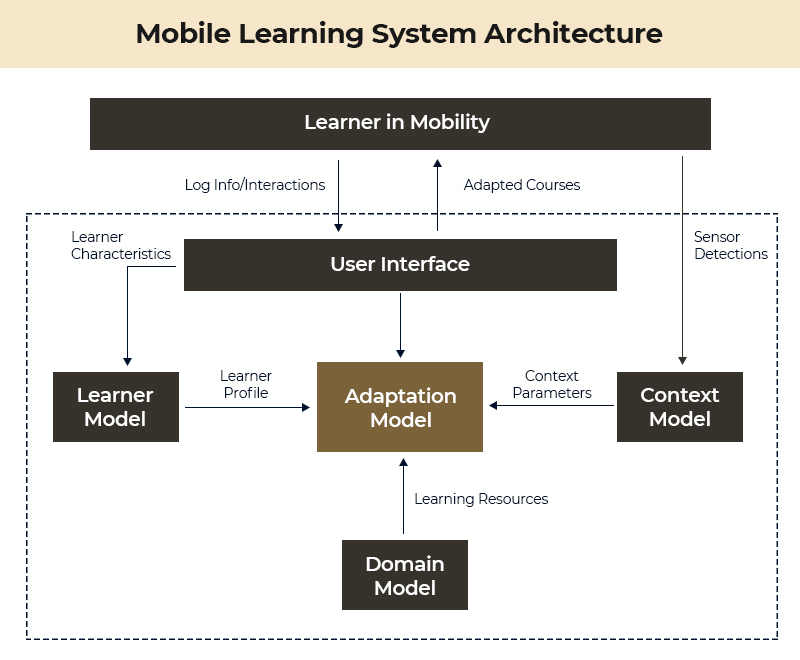
Source: ResearchGate
Create an Education App: The Guide
Development of an application for the purpose of learning via mobile devices like smartphones and tablets is a combination of creativity as well as understanding the eLearning processes. Prior to beginning the development, understanding who all will use the education app is an information of primary importance for the developer.
Questions to be Answered Before Proceeding for Educational App Development
Certain clarifications if at hand before any efforts are put into the development of an eLearning app, the outcome or product will probably suffice all requirements and meet all expectations. A few questions between the product admin and the tech team will speed up the process, enhancing the overall process of learning.
Clarity in Requirements – How much to build?
When we start developing any application, we must be aware that there are endless boundaries to explore across. But we must keep in mind that there are certain limitations to be honored. Considering the primary objective of the eLearning app development, the design and inclusions must be pre-decided.
Whether the app will cater to students, young or senior, professionals, or teachers only, will help decide on the architecture and integrations at an early stage. The inclusions for server support as well as data storage can be based on the requirements shared by the admin. Developing to a point where the app could go live and start enrolling users must be the agenda initially.
What technologies to integrate?
The development team should be made clear whether the app being developed will serve as a platform for live classroom teaching, or will simply cater to textual content sharing between users. Integration of supporting technologies will depend on the primary purpose being met through the educational app development.
The tech team will appropriately decide to include HTML5, JavaScript, and cloud connectivity based on the sophistication of the knowledge and users who will register on the app.
What business model to follow?
Some education apps are only to provide a platform for learners and tutors to connect online and teach, whereas others will be facilitating a lot of activities simultaneously. Whether just exchanging video content, connecting for group seminars, viewing presentations, or discussing a topic, all of these when happening over a single app, demonstrate different business models.
If the business model, or kind of admin, tutor, learner engagement is definite from the beginning, the app designer and developer can together build an interface that will contribute to the efficiency of the entire process happening over the eLearning app. Appropriate software architecture will allow a smooth and uninterrupted learning to happen.
Step-wise Process
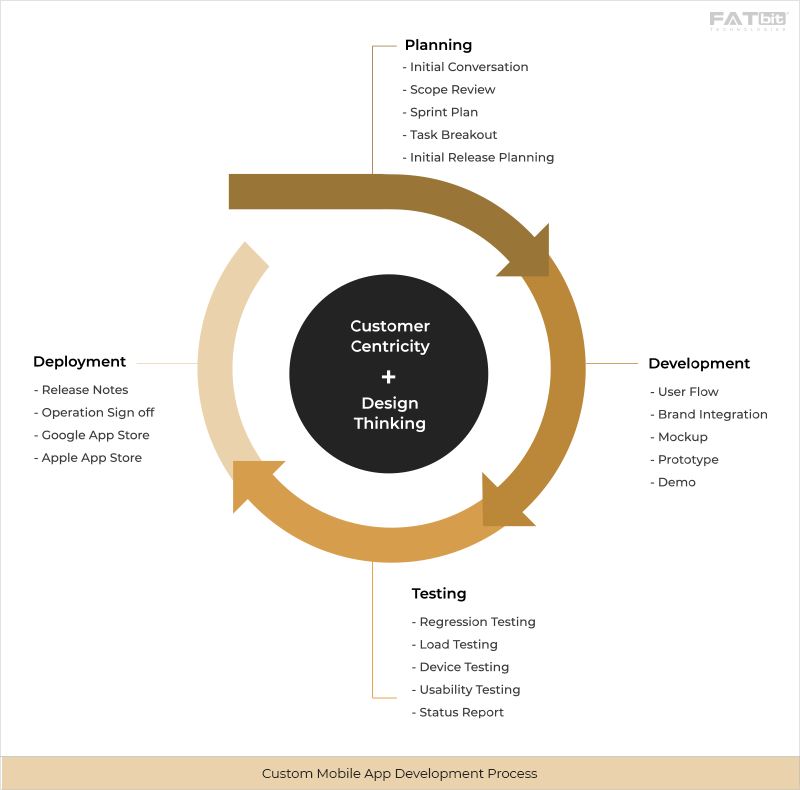
Now that we have reviewed various parameters and pointers to consider and when to create an education app, here is a run through the points that will help through the process.
Ideas for the App
The main point of consideration to begin with is the kind of app to be built. Be certain whether the app is primarily for the students/learners, the tutors/teachers, or corporate professionals. The user stories should be accordingly designed and the flow down the app should be able to help meet the ultimate goal of the education app development.
Business and Market Research
An in-depth knowledge of the eLearning market will help develop an application that caters to the users in the best possible way. A sound business research will provide insight into the competitor apps, and contribute in filling the existing lacunae. Information of the problems being faced by users by the way of a thorough study on the existing educational apps will help a great deal.
Team for Development
The team that goes behind creating the educational app must be complete from all aspects. A team that goes behind building a robust eLearning application should have the following expertise:
- A UI-UX professional – to build screen flow or user journeys.
- Developer or Coder proficient in app building languages like Swift, Kotlin, Java, React Native and in managing MySQL databases.
- App tester skilled in exploring the built architecture for all operations.
- Release assistant trained in DevOps for efficient deployment of the application on play stores across operating systems.
Technology Stack
A senior business analyst engaged from the tech team will understand your requirements and the purpose of launching the educational app. A technology stack that helps meet the custom requirements is necessary rather than choosing to fix what tools to exploit for the development.
- Majority apps that support eLearning processes, across iOS and Android operating systems, with 3-D animations and gamification functionalities are Native applications.
- If planning to opt for a simple and quick launch, the HTML5 web apps, or Hybrid cross platform apps will serve.
- Other than limitations in allowing you to experiment with the eLearning processes over the app, these will allow some basic exchange of information, along with settling comfortably on the pocket.
- Expert advice will always however side the Native application due to the vast opportunities it will place at hand to develop attractive UI-UX.
App Testing
The developed educational app must be tested on all spheres, for the server performance as well as the user interface and features. The tester on the development team will usually be exhaustively exploring the built sections, as per different user profiles that will be expected to use the application.
Some ready-made app testing tools or manual testing can help accentuate the testing process, and bring out the areas where refinement is needed. The app must be tested extensively for the following:
- Regression testing
- Load testing
- Device testing
- Usability testing
- Status report
App Release
The release of the created eLearning application post the testing process will include detailed release notes along with the testing status report supporting the documentation. The DevOps expert on the team will be responsible for launching the application on play stores for both iOS and the Android operating systems.
The final operation sign off will allow streamlined downloading of the application on all devices.
Develop an Education App That Resonates With Your Business Vision
Factors & Considerations: Educational App Development Services
As a business owner, deciding to build an education app is not a step to be taken without keeping in mind the factors surrounding the development scenario. The rationale behind the education app creation must be met from all aspects of its design and development.
Factors to Keep in Mind for UI-UX
The user journey across the application developed for eLearning must provide with ease, access to various modules. The flow of the app should allow the user to comfortably move from feature to feature and make transactions as required for the course material. An unhindered and streamlined application will add to the appeal, maintaining the user interest.
Content Authorization and Certification
Every eLearning application providing courses with study material and learning aids must add some checks to authorizing the content uploaded or available over it. The tutors, teachers, and experts must have verified profiles that authenticate the available matter, adding to the reliability of the application.
Also, the certifications provided on completing the course must be through an authoritative body, whose acknowledgement adds to the credibility of the user’s time spent on learning over the app.
Choosing an App Development Company
A very important parameter while developing an educational app is choosing the right technology partner. A team with adept members, skill sets, and knowledge on the eLearning domain are a must.
Opt for developers who have already delivered eLearning solutions and teams that have successfully helped launch eLearning portals and applications. Only those who have troubleshooted the challenges on the way to developing eLearning platforms will be able to guide you the best way forward.
Factors that Might Cause Roadblocks
Some areas that might crop up as roadblocks while developing the eLearning education app prominently revolve around the generic issues that are prevalent around any online service being offered via a mobile application.
The infrastructure must be chosen depending on the user volume, flow or journey of the user through the application, and the data sharing it supports. Some problems that might arise despite keeping all the checks:
- Data security on the server
- Speed of the internet connection utilized while running the app
- Outdated technology that fails to meet the current document or content requirements
The development team if proficient will have all these factors in mind and will design the application in accordance with the latest development tools and technology.
Transition The eLearning Habitat And Users Onto Mobile Interfaces
Conclusion
Since the world is now at an entirely new place in terms of accepting technology mediated processes in all spheres, online education and eLearning have come out as popular areas that demand an app interface.
With every educational organization and prospective entrepreneur wanting to enter the league of going mobile with their course or eLearning module, a custom mobile application seems to be the ultimate answer.
But developing a competitive and convenient application that makes the learning process worth the time spent online and gives it an edge above the traditional methodologies is a piece of skill. This quick guide will act as a checklist to keep an eye on the important aspects that must not be missed while the development process of an eLearning application.
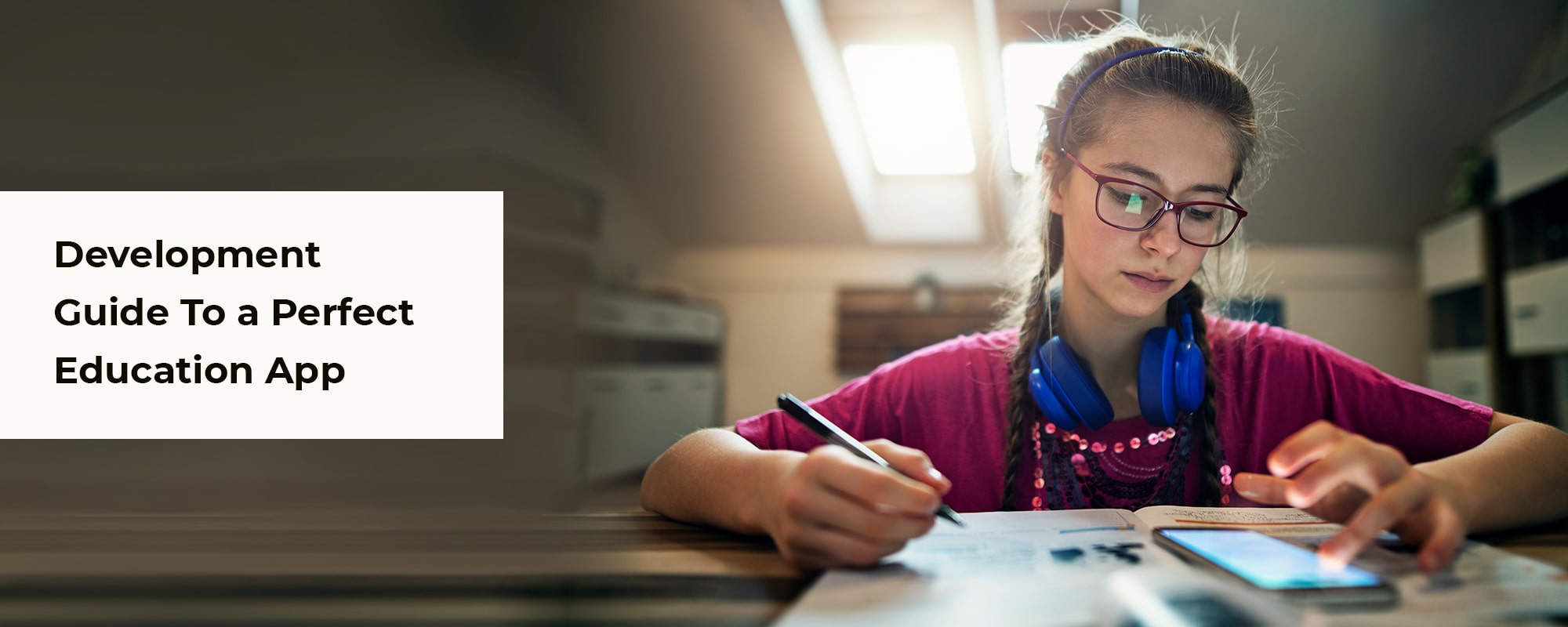









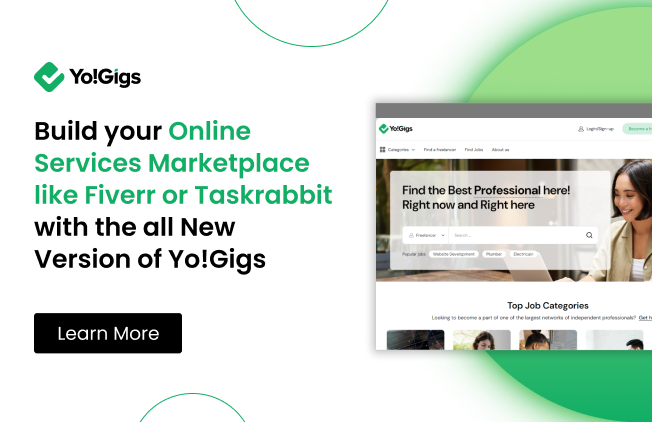
Comments (1)
 Naveen Verma
Naveen Verma
i want a e learning app